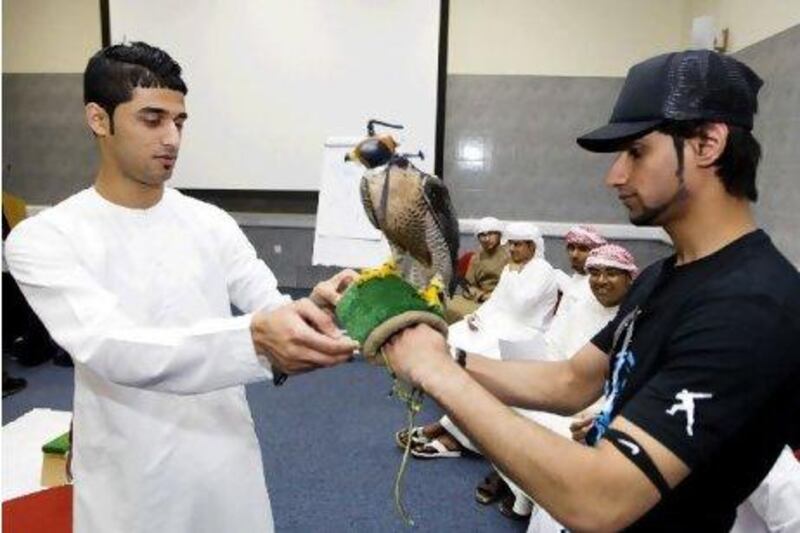FUJAIRAH // Fatima Al Balgouni had never been to a wadi or a farm, or seen a falcon, despite growing up around Fujairah.
Ms Al Balgouni, 18, is not alone. Most of her fellow engineering students are no more acquainted with their local environment.
At school, she said, there was no emphasis on Emirati culture and traditions. Only now is she beginning to learn about her country.
Ms Al Balgouni is part of a pilot group of first-year engineering students at the Fujairah Higher Colleges of Technology who are being taught an ecology field-studies course.
The course is compulsory as part of students' liberal studies, which aim to teach them more broadly based subjects in addition to their chosen degree.
They will take four hours of classes and trips each week for 16 weeks to help them to understand their local environment. They have recently visited Wadi Wurayah, Al Hail Fort and the mangroves in Abu Dhabi.
Ms Al Balgouni said the course was a break from the stressful work in engineering.
"I was afraid of so many things before I did this but I've overcome some of this now," she said, having now touched a falcon, waded through a wadi and kayaked in the mangroves.
"When we went to Masdar in Abu Dhabi they taught us about alternative energy and we've been learning about reusable bags. This is something we should all understand."
Colin Michell is one of the teachers on the course.
"The girls are quite cloistered so it's good to see them becoming more at one with their local environment," Mr Michell said.
During the trip to Wadi Wurayah, the girls in the group went into the water for a better look at what life was in there.
"It was full of life. We found frogs, dragonflies and some non-indigenous fish," Mr Michell added.
Hessah Al Mesmary, 18, said she had learnt a lot from the course.
"We know now that the wadi is important and we have to protect it from pollution," Ms Al Mesmary said. "It's important for the future that we all understand these things. We didn't get taught this stuff at school."
Faisal bin Hanifa, 22, said it also gave him inspiration for his engineering studies.
"I've got project ideas from this, like how to conserve water," Mr bin Hanifa said.
The students this week learnt about falconry, with a workshop introducing them to two different kinds of falcons. Most had never seen one in the flesh before and did not know much about their relevance to UAE culture.
Salem Al Kindi, 19, said that as Emiratis, the students should know their country better.
"We should know our country, our culture, environment - but not just Emiratis, everyone who lives here," Mr Al Kindi said. "I share what I learn with my family."
The course has also helped the students to become more engaged with their studies.
"They want to be here more," said Sean James, another teacher. "Before, a lot of their classes were more formal, learning from a textbook, but with this, it's interactive and they ask more questions.
"They are becoming more enquiring about things, becoming more independent thinkers."
Michael Purcell, the head of academic programmes, said it had made the students feel more involved with their local community.
"It's one of the courses I really get a lot of positive feedback from, which I don't hear much," Mr Purcell said. "They are talking to their families about it and are generally very enthusiastic."






